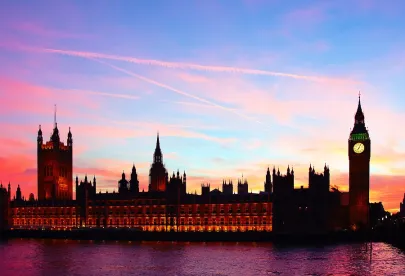In a hearing yesterday, 6 April 2022, the High Court considered an application of the directors of VTB Capital PLC (VTB UK) for the appointment of Teneo Financial Advisory Limited as administrators.
In what Mr. Justice Fancourt described as “an unusual case in all sorts of ways”, the English High Court was faced with a number of questions relating to how the UK’s insolvency regime can interact with the sanctions packages introduced in response to Russia’s invasion of Ukraine.
By way of background, prior to the introduction of the current sanctions, the bank had already been undertaking a wind-down of its UK business since 2014 and the Russian annexation of Crimea. VTB UK was balance sheet solvent as a result of the wind-down programme but the effect of the sanctions had rendered it cashflow insolvent.
The application to appoint Teneo as administrators presented the applicants and the court with a number of questions to address.
Three main questions were considered:
-
Given the historic and ongoing wind-down of VTB UK, could an ordinary administration be used, rather than a special administration as would usually be used for financial services insolvencies where there are client assets to protect and a going concern to be rescued – see e.g. Teneo’s appointment earlier this month as joint special administrators of Sberbank CI?
-
On the basis of the projected timetable (six months) for the completion of the wind-down versus the expected timeframe for the sanctions remaining in place, was it justified for the prospective administrators to primarily focus on achieving a better result for the company’s creditors as a whole than would be likely if the company was wound up, rather than looking to rescue the company as a going concern?
-
Could the company satisfy the court that an administration would achieve a better result for the whole of the company’s creditors than a liquidation?
The court answered each of the above points in the affirmative, but the case was also illuminating for insolvency professionals seeking to act in cases involving sanctioned Russian entities and who are likely to be grappling with the question as to whether they can provide advice and ‘insolvency services’ in such circumstances without a licence from the sanctions authorities.
In the VTB UK case, the UK sanctions authority, the Office of Financial Sanctions Implementation (“OFSI”), had previously granted a licence which, insolvency professionals may be interested to note, covered the month prior the administration application hearing, thus allowing insolvency advisory fees incurred in the run-up to appointment to be properly incurred and paid without breaching the UK’s sanctions regime.
The court did rule in favour of the application but it could not make an order for the appointment of the proposed administrators until such date as the US sanctions authority, the Office of Foreign Assets Control (“OFAC”), granted a licence to VTB UK which would permit the insolvency practitioners to take the steps necessary to manage and distribute the estate. Instead, the court confirmed that it was minded to make an order for administration on the terms sought, but that such order would be held by the court in draft form pending the court receiving sufficient evidence that the OFAC licence had been granted, and that only then would the administration appointment be ordered.
-
Ordinary Administration or Special Administration
In the ordinary course, a business that enters administration in the UK does so through the procedure prescribed under Schedule B1 of the Insolvency Act 1986 (Ordinary Administration). However, the legislation contains provision for the use of certain ‘special’ insolvency procedures that are to be used where special interests need to be protected, alongside the ordinary interests of a company’s creditors. Such special interests often relate to consumers and/or the interest of the regulator(s) of the sector in which the company operates.
For banks such as VTB UK, there is a special administration regime available under the Investment Bank Special Administration Regulations 2011 (the Regulations), SI 2011/245, which came into force on 8 February 2011 pursuant to powers contained in the Banking Act 2009 (BA 2009) (Special Administration).
Many Russian banks and lenders operating in the UK (and across the globe) have been targeted by the Ukraine sanctions (see related GT Alerts here). Very broadly, the effect of the sanctions has been to paralyse the banks, freeze their assets and render them unable to make or receive any payments. As a result, they are unable to pay debts as they fall due, thereby satisfying one of the UK’s two insolvency tests (the other being balance sheet insolvency), and therefore are under a duty to take the necessary steps to enter an insolvency process. Last week, the UK arm of another major Russian bank, Sberbank CIB (UK) Limited entered insolvency via Special Administration.
VTB UK, however, found itself in a peculiar position, in that by the time the sanctions were introduced in 2022 it was already well underway with a wind down of its operations. Reports indicate that in 2014 VTB UK had assets of c.$11.4 billion and around 400 staff, but by 2020 its presence in London had shrunk significantly - -assets were down to c.$1.66 billion and staff numbered only around 150.
The timing of the decision to start a wind-down in 2014 may possibly be indicative of an anticipation of possible sanctions following the Russian incursion into Crimea in that year. That aside, at the time of the sanctions hitting earlier in 2022 VTB UK was in a position whereby its assets far exceeded its liabilities and was well progressed through an orderly wind-down of its remaining (and far diminished) operations.
On that basis, the directors submitted to the court that rather than utilising a Special Administration the insolvency of VTB UK could be dealt with via an Ordinary Administration.
The court considered this issue carefully, but was ultimately comfortable that an Ordinary Administration was suitable, notwithstanding VTB UK’s status as an investment bank, in circumstances where proper notice had been given to all of the required regulatory authorities (including the Bank of England, the Prudential Regulation Authority, the Financial Conduct Authority and the Financial Services and Compensation Authority) who, in turn, had not indicated any intention to make an application for Special Administration and were all in general agreement with the directors that an Ordinary Administration was appropriate.
-
Objective of the Administration
Notwithstanding the consensus of the directors and the various regulatory bodies that an Ordinary Administration was suitable, the directors had to satisfy the court in the usual way that the relevant tests under Schedule B1 of the 1986 Act were met.
While the company was clearly balance sheet solvent, in that the net asset position was overwhelmingly positive, such that there was evidently no balance sheet insolvency (with positive net assets of $338 million, from liabilities of around $980 million liabilities and assets of just over $1.3 billion), there could be no doubt, on the basis of the impact of the sanctions regime, that VTB UK was insolvent and unable to pay its debts as they fell due and thus met the test for insolvency set out in section 123(e) of the 1986 Act.
The next question to be addressed was whether appointment of the administrators the administration would achieve any of the three objectives under the UK’s statutory regime:
-
Rescuing the company as a going concern.
-
Or, achieving a better result for the company’s creditors as a whole than would be likely if the company were wound up (without first being in administration).
-
Or, realising property to make a distribution to one or more secured or preferential creditors.
These objectives proceed on a prescribed hierarchy, where objective A is to be the first and preferred objective, then B, then C.
However, VTB UK submitted to the court that so far as objective A was concerned, given the highly unlikely release of sanctions before the wind-down is completed, the administration application could not properly be advanced on the basis of seeking to rescue VTB UK as the going concern (although it was noted that such a possibility could not be definitively ruled out).
Therefore, the application was pursued squarely on administration objective B.
-
Administration or Liquidation
On the basis that the application largely discounted the possibility of any rescue as a going concern, usually the primary objective of an administration and one of the aspects which distinguishes it from the terminal procedure of liquidation, the court was keen to understand why an administration was more suitable than a liquidation in the circumstances.
While there was no suggestion that if VTB UK were to be wound up rather than having administrators appointed, the creditors would not be paid (given the strong net asset position of the balance sheet), it was argued that a wind up would mean a much more disorderly payment process. It was stressed that a key focus of objective B of the UK’s administration procedure is not just amount of the dividend creditors receive, but also how soon they receive it. As Mr. Justice Fancourt summarised it: “150k today is a better result than 150k in a year”.
On that argument, the court was willing to accept that early payment of creditors is a relevant and important consideration and that, in the circumstances of the case, it was very likely that an orderly winding down by administrators would be beneficial in terms of an early payment and would be extremely likely to result in full payment.
That finding was weighed against the indication that under a liquidation, which would involve the appointment first of the Official Receivers and then onwards transfer of the case to an independent liquidator (who would not be as familiar with the case as the proposed administrators), there would be a later payment, and perhaps even an outside risk that creditors would not receive payment in full. On the latter possibility, it was noted that a number of key employees and suppliers had to be paid as soon as possible to avoid them deciding to walk away from the business. Without key individuals and arrangements in place, an insolvency practitioner would have a much harder job in making a distribution in full.
In those circumstances, the court was satisfied that the appointment of the proposed administrators would achieve a better result for the creditors as a whole than would be likely if VTB UK were wound up.






 />i
/>i
